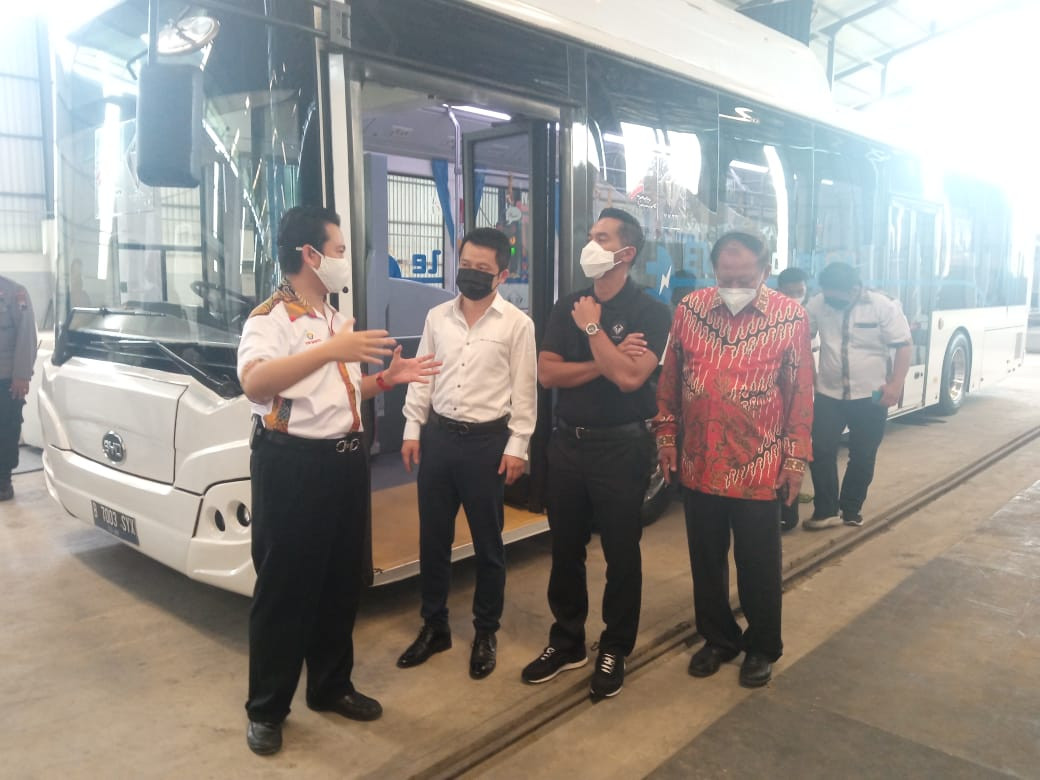Popular Reads
Top Results
Can't find what you're looking for?
View all search resultsPopular Reads
Top Results
Can't find what you're looking for?
View all search resultsVKTR to build electric bus, truck assembly plant next year after IPO
VKTR, the electric vehicle (EV) arm of the conglomerate Bakrie Group, plans to build an assembly plant next year and locally produce some of electric four-wheeler components after its IPO on June 19.
Change text size
Gift Premium Articles
to Anyone
P
T VKTR Teknologi Mobilitas, an electric vehicle (EV) subsidiary of local conglomerate Bakrie and Brothers, said it would build its assembly plant next year, following an initial public offering (IPO) scheduled to take place on June 19.
Its subsidiary VKTR Trisakti will be the one building the production plant, which will be located in Magelang, Central Java. The plant will handle both assembly for electric trucks and buses.
“In the future, we are not going to only import the units, but partially import bus parts and we will assemble it ourselves,” Achmad Syarif Kadir, chief investor and corporate secretary told The Jakarta Post on Tuesday.
Currently, VKTR has acted as a trading company that imports completely built-up (CBU) K9 electric buses from BYD, China’s largest EV manufacturer, which has been used by city-owned bus operator Transjakarta.
Achmad went on to say that there are some bus components that will be produced locally through its sister company Bakrie Autoparts, which has experience in producing automobile spare parts.
He has not revealed how many percent of bus parts will be produced locally, but sooner or later he expects the company will be obliged to meet a certain amount of local content (TKDN) required by the government.
The government has said that electric four-wheelers should have at least 40 percent of local contents until 2023 and will be increased to 80 percent in 2030, as stipulated under Presidential Regulation No. 55/2019.
He said EVs still have similar parts that are used in combustion vehicles, such as wheels and brakes, implying locally produced vehicle parts are doable.
“We will prepare the facility first. Then, if we already have an agreement with the government, we will try to have some percentage of the buses to be locally produced,” Achmad said.
Read also: Luhut claims progress on Tesla, other EV deals
Anindya Novyan Bakrie, chairman of VKTR, said the company would first focus on electric buses and trucks, arguing that the company aims to create a different positioning against other competing players in the local EV market.
He explained that electric buses could address various concerns, including traffic congestion and pollution, while at the same time serving as the most affordable way to familiarize people with decarbonization efforts through electrifying public transportation.
“Will we go to [electric] cars? First, we’ll wait. Cars are interesting, but not today,” Anindya told reporters during a media briefing on Tuesday.
Gilarsi W. Setijono, president director of VKTR said at the same event that by focusing on buses, he hoped EVs could become more accessible to individuals with different socioeconomic statuses.
“What we can hope from having buses is when someone plans to invest in their own choice of transportation, which, I believe, they would like electric vehicles,” Gilarsi said.
Gilarsi added, VKTR is also developing an electric motorcycle, which is currently still in research and development. According to the company's website, the two-wheelers are expected to be launched around the middle of this year.
Read also: Indonesian EV early adopters face long road ahead
VKTR will be listed under ticker VKTR and plans to sell 8.75 billion shares, which is equivalent to 20 percent of its total shares.
The company has set an IPO price of Rp 100 apiece, which is on the lowest of its price range of between Rp 100 and Rp 300 apiece. By that amount, it plans to raise around Rp 875 billion (US$58.86 million).
The company plans to use 44.61 percent of the money raised in its IPO for working capital and another 39.93 percent for building the assembly facilities for four-wheelers, two-wheelers and battery packs, as well as for research and development.
Another 11.59 percent of the IPO money will go to PT Bakrie Autoparts, VKTR's subsidiary, which operates commercial vehicles’ spare part businesses. The rest will be used to settle outstanding loans to other parties, the company said.
“I don’t think Rp 100 apiece is expensive. In fact, we put a very cheap price for such big potential,” VKTR’s Gilarsi said.










